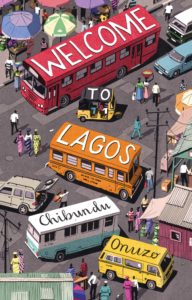Welcome to Lagos begins well outside of the Nigerian metropolis, at a hot and dirty army outpost somewhere in the Niger delta: oil country, but also rebel country. Serving under a corrupt colonel and terrorizing local people is not what Chike Ameobi signed up for the army to do. After twelve months as an officer in that region of bad rations and pointless conflict, he’s had enough. During a nighttime raid, he and Private Yemi Oke leg it into the brush. It’ll be death if they get caught by either rebels or army, or possibly even just the local people, but death could come for them just as easily on patrol, or if the colonel finds out they weren’t shooting at civilians like the rest of their unit. On their way out, they discard parts of their uniforms. Then they hope for the best.
Early the next morning, they surprise a young man at a vulnerable moment. Chike and Yemi take him hostage, pressuring him to take them to the main road. “Whenever Chike described what happened next, he began by saying it was mythical. … He saw a girl appearing as if from the tree itself, her legs sprouting from the bole, her arms fro the brambles, her hair a compost of twigs and leaves.” (p. 21) She runs smack into their hostage, who improbably calls himself Fineboy; there is a brief tussle and then she faints. Her name is Isoken, she has gotten lost from her parents, and says she was attacked during the night by a group of men who wanted to rape her. Isoken leads them to a village where she has an uncle, but it turns out the uncle is not much better than the night gang. Four of the novel’s five main characters are now assembled. Oma, the fifth, joins them on the crowded bus to Lagos, wedged in the front seat with Chike. She is fleeing a husband who beats her.
At first it looks like Chike’s new, hodgepodge platoon will disperse as soon as they make it to the big city. Part of Onuzo’s art is how natural she makes it seem that these unlikely allies stay together amidst the teeming millions in Lagos, how chance encounters form bonds that overcome initial mistrust and build a group that looks after each other. Two additional strands of the novel follow first Ahmed Bakare, editor of the Nigerian Journal, son of a wealthy family who has come back from a banking job in England to try to make a positive difference in his native country. Corruption can kill a crusading paper more thoroughly than the violence that the army used in the old days; if word from on high gets around that no one should buy ads in the paper’s pages, it will run out of money sooner or later. Ahmed has to balance his ideals with the realities of staying in business and protecting his staff, knowing all the while that he is disappointing his parents by not pursuing a more conventional career in business or graft, or at least staying in England and angling for respectability. The other strand follows Chief Sandayo, soon to be former Minister of Education. He had risen from activism in the Yoruba lands of the southwest, where he built schools and improved education, to the political capital of Abuja, where intrigues eventually get the better of him and he flees just ahead of ignominy and possibly worse.
About a third of the way through the novel, these strands become entangled in a way that is at once improbable and of a piece with the chaos of Lagos. The rest concerns the choices that all of the characters make after their collision, and whether they can make any headway in the swirling cross-currents of the city and nation.
I have read very little fiction from or about Africa, and none of the author’s previous work, so one of the things I enjoyed most about Welcome to Lagos was not really knowing what the shape of the story would be like. With a mystery, or a caper, or swords and sorcery, or other genres I know well, I would have had a more experienced sense of the pacing, the kinds of events I was likely to encounter, what kind of resolution to expect, and so forth. In Lagos, I was out of my depth as much as the characters — more so, really, not knowing much of the cultural background. Onuzo provided enough context for a newcomer to come along, but not so much as to make life in the big city easy for a first-time visitor. The characters sometimes speak in the non-English languages that are natural for them, or in various levels of dialect and pidgin, as befits their background and the situation. I didn’t feel like I missed anything crucial by not knowing any Yoruba (for example), but the insertions were reminders of Nigeria’s, and Lagos’, variety.
The characters have their individual and collective struggles. Onuzo shares her ensemble admirably; I had a sense of each of them as a person (though Chike is, fittingly, first among equals) as well as how they fit together as an uneasy group. The event that brings the novel’s strands together tests those uncertain bonds, and leads to a resolution for almost all of the characters, at least a resolution of their welcome and start in Lagos. Welcome to Lagos is terrific, and I look forward to reading more from Onuzo.


1 pings
[…] to get degrees, and jobs afterward. “O2 Arena” is not as finely polished as, say, Welcome to Lagos, but its drive and science-fictional imagining made me like it and look forward to more from […]